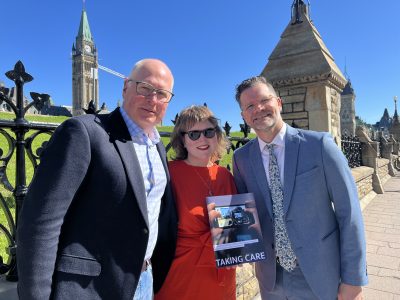Workers in Canada’s news industry – watchdogs of our democracy – are suffering disturbingly high levels of work-related stress and injury, according to a new report released Wednesday on Parliament Hill.

Dave Seglins, Tracey Lindeman and Matthew Pearson on Parliament Hill.
Taking Care: a report on mental health, well-being and trauma among Canadian media workers is a first-of-its-kind national study, based on 1,251 detailed survey responses from freelancers to news executives, desk editors to frontline reporters and video journalists. Assistant professor Matthew Pearson and veteran journalist Dave Seglins led the study, which benefitted from the contributions and support of graduate research assistants Erika Ibrahim, Cassandra Yanez-Leyton and Tracey Lindeman.
“The Taking Care survey results confirm some of our worst fears and suspicions about our industry,” said Pearson. “The onus now is on newsroom leaders, executives and journalism educators to grasp the gravity of this situation and meaningfully address it to stop the harms Canadian media workers are suffering on the job.”
The study provides comprehensive data on how growing harassment of media workers, COVID-19, workload, job insecurity and a culture that neglects employee health are causing high rates of anxiety, depression, burnout and trauma-related injury.
The 20-minute anonymous online survey was conducted between Nov. 1 and Dec 18, 2021 and reveals some startling health impacts resulting from events of the last four years:
Respondent mental health symptoms at rates far above Canadian average
69 % report anxiety
46 % depression
15 % post-traumatic stress injury (PTSD)
Media workers face high rates of trauma exposure (stories of death, injury, suffering):
- Two-thirds negatively affected by graphic, disturbing stories
- 80% suffered burnout as a result of trauma coverage
- 1 in 10 have thought about suicide tied to coverage
Media workers face rampant harassment online and in the field:
- 56% report online harassment and threats
- 35% experienced harassment in the field
Other major findings:
- 46% report higher-risk drinking and 26% are heavy drinkers
- 53% have sought medical help to deal with work stress and mental health
- 85% have never received training on mental health and trauma at work
“Journalists and media workers expressed high rates of job satisfaction,” said Dave Seglins, a senior investigative journalist with CBC News and industry mental health advocate, and the project’s other lead researcher. “What that tells us is that many people love their jobs, but their jobs don’t always love them.”
“This is a wake-up call,” Seglins added. “There is an alarming amount of stress in virtually all corners of the industry and something must be done. This is not just a ‘management issue.’ Everyone in the industry – from the frontlines, to assignment, to newsroom managers, to corporate executives, to unions and associations – all have a role to play in changing the culture.”
Pearson added: “By recognizing media workers’ elevated risks of trauma, acknowledging their personal sacrifices and honouring their commitment, we can together create a healthier, more sustainable news industry – one that better supports its people in pursuit of journalism’s greater mission of serving the public good.”
The researchers received funding from the Social Sciences and Humanities Research Council (SSHRC), the Canadian Journalism Forum on Violence and Trauma and Carleton University. The report was tabled at a news conference on Parliament Hill sponsored by Senator Paula Simmons, herself a journalist and political columnist.
Wednesday, May 25, 2022 in General, Journalism News
Share: Twitter, Facebook



